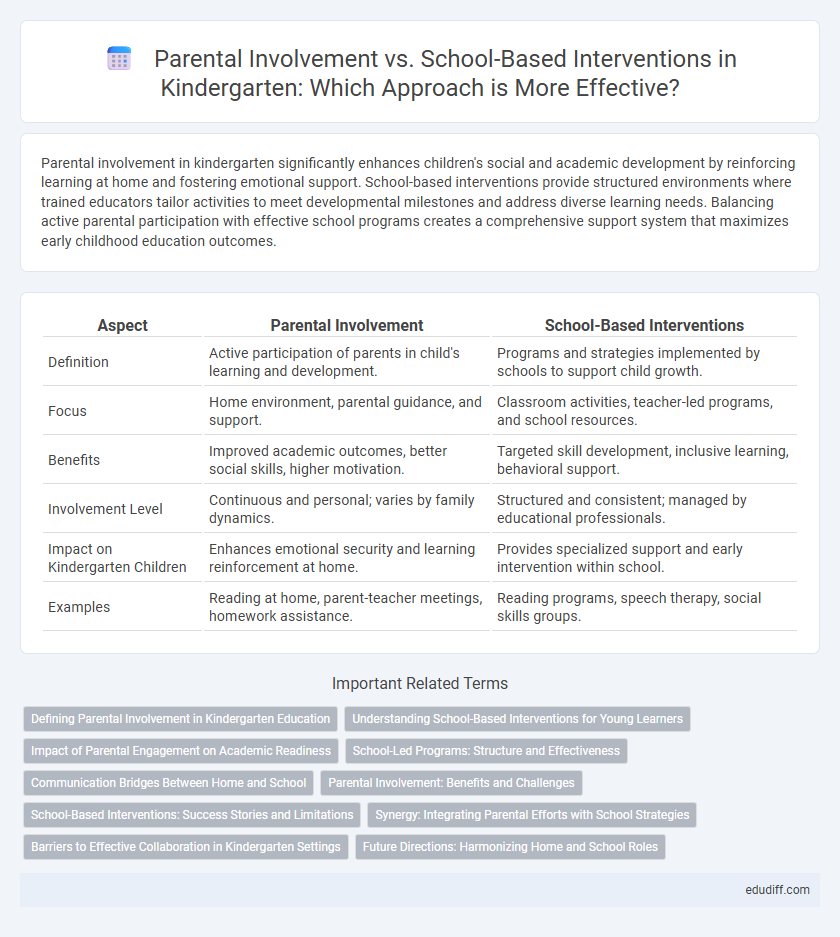Parental involvement in kindergarten significantly enhances children's social and academic development by reinforcing learning at home and fostering emotional support. School-based interventions provide structured environments where trained educators tailor activities to meet developmental milestones and address diverse learning needs. Balancing active parental participation with effective school programs creates a comprehensive support system that maximizes early childhood education outcomes.
Table of Comparison
| Aspect | Parental Involvement | School-Based Interventions |
|---|---|---|
| Definition | Active participation of parents in child's learning and development. | Programs and strategies implemented by schools to support child growth. |
| Focus | Home environment, parental guidance, and support. | Classroom activities, teacher-led programs, and school resources. |
| Benefits | Improved academic outcomes, better social skills, higher motivation. | Targeted skill development, inclusive learning, behavioral support. |
| Involvement Level | Continuous and personal; varies by family dynamics. | Structured and consistent; managed by educational professionals. |
| Impact on Kindergarten Children | Enhances emotional security and learning reinforcement at home. | Provides specialized support and early intervention within school. |
| Examples | Reading at home, parent-teacher meetings, homework assistance. | Reading programs, speech therapy, social skills groups. |
Defining Parental Involvement in Kindergarten Education
Parental involvement in kindergarten education encompasses active participation in children's learning activities, communication with teachers, and support for developmental milestones at home. It includes behaviors such as reading together, attending parent-teacher conferences, and reinforcing classroom routines. Research shows that consistent parental engagement positively influences early literacy, social skills, and overall academic readiness in kindergarten students.
Understanding School-Based Interventions for Young Learners
School-based interventions for young learners in kindergarten focus on tailored educational programs, behavioral support, and in-classroom assistance to enhance early childhood development and learning outcomes. These interventions often include specialized curricula, teacher training, and resource allocation designed to address diverse learning needs within the classroom environment. Research shows that when combined with parental involvement, school-based strategies significantly improve cognitive, social, and emotional skills among kindergarten students.
Impact of Parental Engagement on Academic Readiness
Parental engagement significantly enhances academic readiness in kindergarten by fostering early literacy, numeracy skills, and social-emotional development. Research shows children with actively involved parents demonstrate higher language acquisition, improved cognitive abilities, and greater classroom participation compared to peers relying solely on school-based interventions. These outcomes emphasize the critical role of parental involvement in complementing educational strategies to optimize kindergarten readiness and long-term academic success.
School-Led Programs: Structure and Effectiveness
School-led programs in kindergarten emphasize structured activities designed to enhance early childhood development through evidence-based curricular frameworks and trained educators. These interventions often include literacy, social-emotional learning, and cognitive skill-building components, showing significant improvements in student readiness and long-term academic performance. Research indicates that school-based programs provide consistent quality and equitable access, making them highly effective for supporting diverse learner populations.
Communication Bridges Between Home and School
Effective communication bridges between home and school significantly enhance kindergarten children's learning experiences by fostering parental involvement in educational activities. Tools such as regular newsletters, digital apps, and parent-teacher conferences facilitate timely information exchange, ensuring consistency between school-based interventions and home support. This collaborative approach positively impacts children's social, emotional, and academic development during early childhood education.
Parental Involvement: Benefits and Challenges
Parental involvement in kindergarten significantly enhances children's academic performance, social skills, and emotional development by fostering a supportive learning environment at home. Engaged parents contribute to better attendance, higher motivation, and improved behavior, creating a crucial partnership between families and educators. Challenges include time constraints, varying literacy levels among parents, and cultural differences that may hinder consistent communication and participation in school activities.
School-Based Interventions: Success Stories and Limitations
School-based interventions in kindergarten settings have demonstrated success in improving literacy rates and social skills through targeted programs like phonics instruction and social-emotional learning curricula. Evidence from studies such as the Chicago Child-Parent Centers indicates enhanced academic performance and reduced achievement gaps attributed to structured in-class support and teacher-led initiatives. Limitations include variable implementation fidelity across schools and limited engagement with families, which can hinder the full potential of these interventions.
Synergy: Integrating Parental Efforts with School Strategies
Integrating parental involvement with school-based interventions in kindergarten enhances children's learning outcomes and social-emotional development by creating a cohesive educational environment. Collaborative approaches such as joint workshops, consistent communication, and shared goal-setting foster synergy between families and educators, amplifying the impact of both efforts. Evidence shows that combining home support with structured school programs results in improved literacy, numeracy skills, and positive behavioral patterns in young learners.
Barriers to Effective Collaboration in Kindergarten Settings
Parental involvement in kindergarten significantly enhances early childhood development, yet barriers such as language differences, time constraints, and lack of trust impede effective collaboration with school-based interventions. School staff often face challenges engaging parents due to socioeconomic disparities and limited communication channels, which reduce the impact of joint educational efforts. Overcoming these obstacles requires targeted strategies that foster mutual understanding and flexible participation opportunities to support children's learning outcomes.
Future Directions: Harmonizing Home and School Roles
Promoting a cohesive partnership between parental involvement and school-based interventions enhances kindergarteners' developmental outcomes by aligning educational goals and communication strategies. Future directions emphasize collaborative frameworks that integrate family engagement programs with teacher-led initiatives, fostering consistent support across home and school environments. Implementing technology-driven platforms and professional development for educators can further harmonize the roles, maximizing early childhood learning and social-emotional growth.
Parental involvement vs School-based interventions Infographic

 edudiff.com
edudiff.com